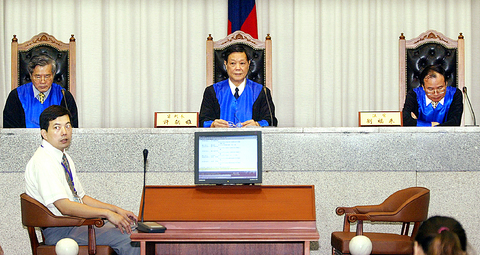The Supreme Court yesterday ruled that the re-election of President Chen Shui-bian (陳水扁) and Vice President Annette Lu (呂秀蓮) was valid, dismissing one of two lawsuits by pan-blue-camp lawyers claiming that Chen and Lu were unfairly elected.
The Taiwan High Court ruled against the pan-blue camp's election lawsuit last November. The decision was then appealed to the Supreme Court. Yesterday's verdict cannot be appealed.
"The court rejects the plaintiff's three claims because the pan-blue camp has failed to provide adequate evidence for any of the arguments presented to the court," Judge Shih Chao-hsiung (許朝雄) said.

TAIPEI TIMES POOL PHOTO
The judge said pan-blue-camp claims that the pan-green camp had attempted to influence or manipulate the result of the presidential election by staging an assassination attempt on March 19, the eve of the election, were not backed up by any evidence.
He also referred to pan-blue-camp claims that two Kaohsiung-based underground radio stations had reported that Chen and Lu had been the victims of a conspiracy by the pan-blue camp and the Chinese Communist Party.
But he said that there was no evidence to show that Chen and Lu had ordered the stations to do this.
The judge said pan-blue lawyers had also claimed Chen and Lu avoided the public after the shooting in order to win more voter sympathy. But he said that the matter had no bearing on the law relating to presidential elections.
Shih said the pan-blue-camp lawyers had contended that Chen and Lu had staged the assassination attempt, then launched a so-called "national security mechanism" to influence the election.
The lawyers claimed that military and police personnel, allegedly mostly pan-blue supporters, were thus deprived of the ability to vote.
But Shih said the increased security measures implemented by the Ministry of National Defense were lawful. In addition to this, he said, no evidence had been presented to the court showing that Chen had ordered the activation of a "national security mechanism."
On the allegation that Chen used the referendum on the day of the presidential election to unfairly influence the result of the election itself, the court said that Chen had never required the Cabinet to hold the referendum concurrently with the election, and that it had just been a suggestion.
He said the Central Election Commission decided to hold the referendum with the presidential election. The court therefore could not conclude that Chen had tried to influence the election.
Also see story:

AGING: As of last month, people aged 65 or older accounted for 20.06 percent of the total population and the number of couples who got married fell by 18,685 from 2024 Taiwan has surpassed South Korea as the country least willing to have children, with an annual crude birthrate of 4.62 per 1,000 people, Ministry of the Interior data showed yesterday. The nation was previously ranked the second-lowest country in terms of total fertility rate, or the average number of children a woman has in her lifetime. However, South Korea’s fertility rate began to recover from 2023, with total fertility rate rising from 0.72 and estimated to reach 0.82 to 0.85 by last year, and the crude birthrate projected at 6.7 per 1,000 people. Japan’s crude birthrate was projected to fall below six,

US President Donald Trump in an interview with the New York Times published on Thursday said that “it’s up to” Chinese President Xi Jinping (習近平) what China does on Taiwan, but that he would be “very unhappy” with a change in the “status quo.” “He [Xi] considers it to be a part of China, and that’s up to him what he’s going to be doing, but I’ve expressed to him that I would be very unhappy if he did that, and I don’t think he’ll do that. I hope he doesn’t do that,” Trump said. Trump made the comments in the context

SELF-DEFENSE: Tokyo has accelerated its spending goal and its defense minister said the nation needs to discuss whether it should develop nuclear-powered submarines China is ramping up objections to what it sees as Japan’s desire to acquire nuclear weapons, despite Tokyo’s longstanding renunciation of such arms, deepening another fissure in the two neighbors’ increasingly tense ties. In what appears to be a concerted effort, China’s foreign and defense ministries issued statements on Thursday condemning alleged remilitarism efforts by Tokyo. The remarks came as two of the country’s top think tanks jointly issued a 29-page report framing actions by “right-wing forces” in Japan as posing a “serious threat” to world peace. While that report did not define “right-wing forces,” the Chinese Ministry of Foreign Affairs was

PREPAREDNESS: Given the difficulty of importing ammunition during wartime, the Ministry of National Defense said it would prioritize ‘coproduction’ partnerships A newly formed unit of the Marine Corps tasked with land-based security operations has recently replaced its aging, domestically produced rifles with more advanced, US-made M4A1 rifles, a source said yesterday. The unnamed source familiar with the matter said the First Security Battalion of the Marine Corps’ Air Defense and Base Guard Group has replaced its older T65K2 rifles, which have been in service since the late 1980s, with the newly received M4A1s. The source did not say exactly when the upgrade took place or how many M4A1s were issued to the battalion. The confirmation came after Chinese-language media reported